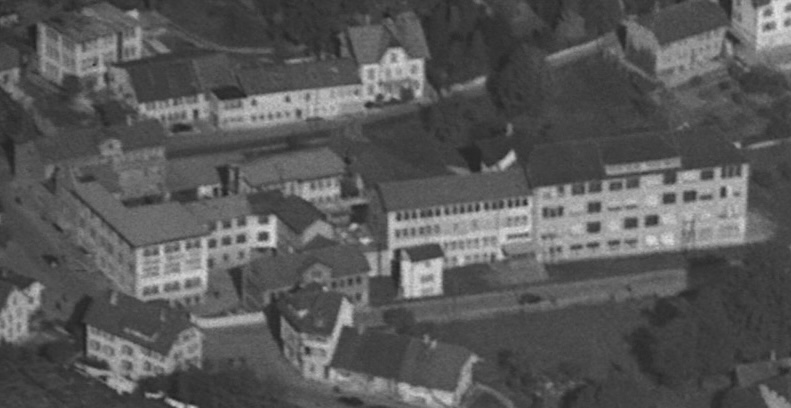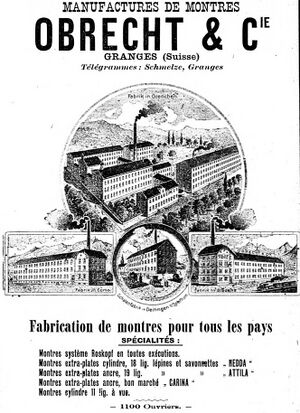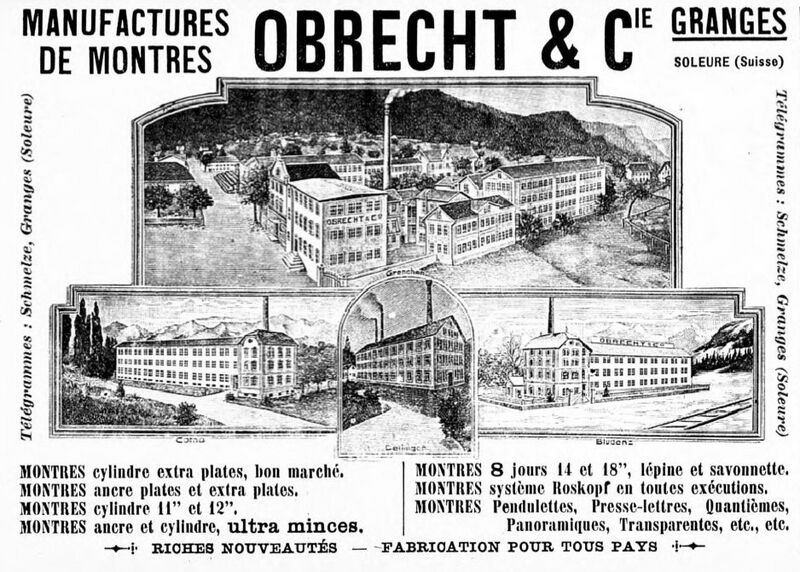Schmelzi: Difference between revisions
No edit summary |
No edit summary |
||
| (2 intermediate revisions by the same user not shown) | |||
| Line 2: | Line 2: | ||
[[File:1949 ETH-BIB-Grenchen-LBS H1-012752 Obrecht et Cie.jpg|center|800px|thumb|The Schmelzi factory complex in 1949]] | [[File:1949 ETH-BIB-Grenchen-LBS H1-012752 Obrecht et Cie.jpg|center|800px|thumb|The Schmelzi factory complex in 1949]] | ||
The first watch workshop in Grenchen was established in the Schmelzi area by Gebrüder Kohler about [[1844]]. | |||
In [[1888]], [[Edouard Kummer]], [[Jean Schwarzentrub]], and [[Peter Obrecht]] established their [[ebauche]] factory on Schmelzistrasse. | |||
==Buildings== | |||
[[File:Ins-001 1990 005 0105 Grenchen Rues-001-000 Schmelzi schematic.jpg|center|800px]] | |||
[[File:Davoine 1908 0655 Obrecht Granges Ad.jpg|right|300px|thumb|This 1908 advertisement shows the Obrecht & Cie factories in Grenchen, Como, Deitingen, and Bludenz]] | [[File:Davoine 1908 0655 Obrecht Granges Ad.jpg|right|300px|thumb|This 1908 advertisement shows the Obrecht & Cie factories in Grenchen, Como, Deitingen, and Bludenz]] | ||
The Schmelzi factory complex is bounded by Schmelzistrasse to the west, Schild-Hugi Strasse to the south, and Höhenweg to the north. | |||
The factory complex began in [[1882]] with the founding of the firm later called [[P. Obrecht & Cie]]. This company planned a vertically integrated and mechanized factory using American methods, producing [[ebauche]]s and finished watches. The company focused on producing cheaper [[Roskopf]] watches in [[1891]], becoming known as [[Obrecht & Cie]] in [[1913]]. By 1914 the factory employed 1,500 workers and produced 6,000 watches daily. The company went bankrupt in 1922 and the factory was acquired by [[Felsa]] as their Fabrique d'Ebauches et de Finissage. Felsa joined [[Ebauches SA]] in 1928 but continued production at Schmelzi until moving to the [[Schützengasse]] factory in [[1941]]. | |||
Technica AG moved into the factory in 1941. The Schreiber & Co. clock hand factory was also located there since 1924, and [[Wega]] produced watches there since [[1925]]. | |||
* I and II: Built in 1883, expanded in 1888 and 1892 | |||
* III: Built in 1888 as a machine house and workshop | |||
* IV: Retail showroom built by Josef Wyss in 1909 | |||
* V: Office and warehouse built in 1901 | |||
* VI: Workshop built in 1901 | |||
* VII: Factory built in 1904. Connecting wings were built in 1905 and 1910 to connect to most other buildings in the complex. | |||
* VIII: Built by Alfons Rudolf in 1917, probably as a replacement for building VI. | |||
* IX: Shed, built in 1918. | |||
* X: Factory, formerly Josef Rossi, built in 1917. | |||
* XI: Hall built in 1930 replacing the Strausack sawmill, which was built before 1866. | |||
Most of the facility was demolished in 1955 and a new factory was built, with an office building added in 1963. These modern buildings remain to this day. The only surviving building from the original complex is the Rossi factory (building X), built in 1917 on Schild-Hugi Strasse. | |||
On July 1, [[1903]], the firm of P. Obrecht & Cie was dissolved and replaced by a new company, simply called [[Obrecht & Cie]]. This was a limited partnership between Adolf Obrecht and Peter Obrecht. Adolf was the unlimited partner, with Peter limited to his investment of 150,000 francs. The firm specialized in the construction and trade of ebauches, finishing, and finished watches, and was located at the Schmelzi factory complex in Grenchen, across the street from the [[Mühlestrasse]] factory used by [[A. Schild]]. This factory previously housed [[Baumgartner & Michel]] (successor to [[Friedli, Triebold & Cie]]), [[E. Vogt]], [[Ruefli, Vogt & Cie]], [[Affolder, Gygi & Cie]], and (since at least 1883), P. Obrecht & Cie, and later was home to the [[Roskopf]] operation. | On July 1, [[1903]], the firm of P. Obrecht & Cie was dissolved and replaced by a new company, simply called [[Obrecht & Cie]]. This was a limited partnership between Adolf Obrecht and Peter Obrecht. Adolf was the unlimited partner, with Peter limited to his investment of 150,000 francs. The firm specialized in the construction and trade of ebauches, finishing, and finished watches, and was located at the Schmelzi factory complex in Grenchen, across the street from the [[Mühlestrasse]] factory used by [[A. Schild]]. This factory previously housed [[Baumgartner & Michel]] (successor to [[Friedli, Triebold & Cie]]), [[E. Vogt]], [[Ruefli, Vogt & Cie]], [[Affolder, Gygi & Cie]], and (since at least 1883), P. Obrecht & Cie, and later was home to the [[Roskopf]] operation. | ||
[[File:Davoine 1913 0779 Obrecht Ad.jpg|center|800px|thumb|This 1913 advertisement features a different view of the Schmelzi factory]] | [[File:Davoine 1913 0779 Obrecht Ad.jpg|center|800px|thumb|This 1913 advertisement features a different view of the Schmelzi factory]] | ||
==See Also== | |||
* [[Mühlestrasse]] ([[A. Schild]]) | |||
* [[Fabrikstrasse]] ([[Eterna]]) | |||
* [[Schützengasse]] ([[A. Michel]]) | |||
[[Category:Grenchen]] | [[Category:Grenchen]] | ||
Latest revision as of 01:00, 1 May 2024
The Schmelzi factory complex is located in the heights above Grenchen, across Schild-Hugi Strasse from the Mühlestrasse complex used by A. Schild. It was home to Obrecht & Cie as well as the Baumgartner factory.

The first watch workshop in Grenchen was established in the Schmelzi area by Gebrüder Kohler about 1844.
In 1888, Edouard Kummer, Jean Schwarzentrub, and Peter Obrecht established their ebauche factory on Schmelzistrasse.
Buildings


The Schmelzi factory complex is bounded by Schmelzistrasse to the west, Schild-Hugi Strasse to the south, and Höhenweg to the north.
The factory complex began in 1882 with the founding of the firm later called P. Obrecht & Cie. This company planned a vertically integrated and mechanized factory using American methods, producing ebauches and finished watches. The company focused on producing cheaper Roskopf watches in 1891, becoming known as Obrecht & Cie in 1913. By 1914 the factory employed 1,500 workers and produced 6,000 watches daily. The company went bankrupt in 1922 and the factory was acquired by Felsa as their Fabrique d'Ebauches et de Finissage. Felsa joined Ebauches SA in 1928 but continued production at Schmelzi until moving to the Schützengasse factory in 1941.
Technica AG moved into the factory in 1941. The Schreiber & Co. clock hand factory was also located there since 1924, and Wega produced watches there since 1925.
- I and II: Built in 1883, expanded in 1888 and 1892
- III: Built in 1888 as a machine house and workshop
- IV: Retail showroom built by Josef Wyss in 1909
- V: Office and warehouse built in 1901
- VI: Workshop built in 1901
- VII: Factory built in 1904. Connecting wings were built in 1905 and 1910 to connect to most other buildings in the complex.
- VIII: Built by Alfons Rudolf in 1917, probably as a replacement for building VI.
- IX: Shed, built in 1918.
- X: Factory, formerly Josef Rossi, built in 1917.
- XI: Hall built in 1930 replacing the Strausack sawmill, which was built before 1866.
Most of the facility was demolished in 1955 and a new factory was built, with an office building added in 1963. These modern buildings remain to this day. The only surviving building from the original complex is the Rossi factory (building X), built in 1917 on Schild-Hugi Strasse.
On July 1, 1903, the firm of P. Obrecht & Cie was dissolved and replaced by a new company, simply called Obrecht & Cie. This was a limited partnership between Adolf Obrecht and Peter Obrecht. Adolf was the unlimited partner, with Peter limited to his investment of 150,000 francs. The firm specialized in the construction and trade of ebauches, finishing, and finished watches, and was located at the Schmelzi factory complex in Grenchen, across the street from the Mühlestrasse factory used by A. Schild. This factory previously housed Baumgartner & Michel (successor to Friedli, Triebold & Cie), E. Vogt, Ruefli, Vogt & Cie, Affolder, Gygi & Cie, and (since at least 1883), P. Obrecht & Cie, and later was home to the Roskopf operation.
